Stone baths: types, tips for choosing
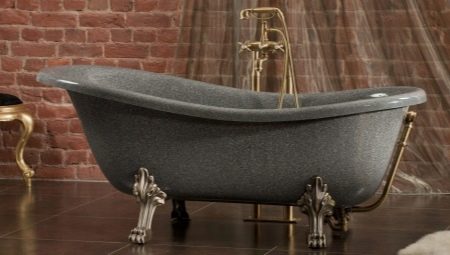
The bathroom is the most unique room in the house, used not only for its intended purpose, but also for stress relief, rest and relaxation. Once in this room, each person is immersed in an atmosphere of comfort and tranquility. And this is not surprising, because the bathtub plays the main role in the room. It should be comfortable, functional, and most importantly, beautiful. Models made of stone are suitable for all these requirements. They are just considered a fashion trend.
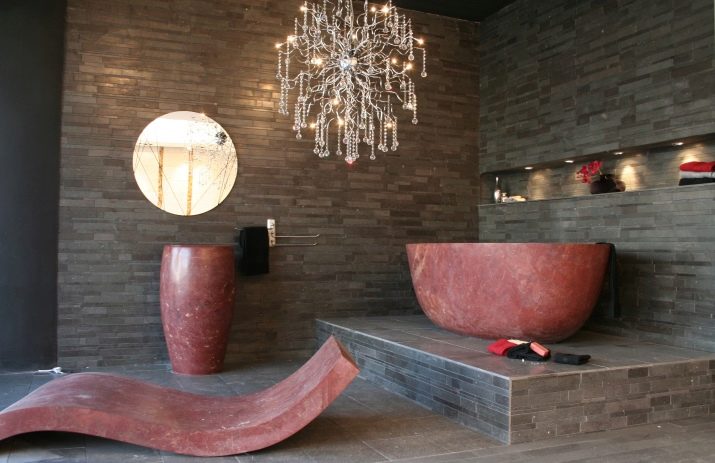
Peculiarities
For many decades, mankind has been using baths, and no one can imagine a comfortable life without this plumbing device. According to historical records, the very first bathing bowls appeared about 5,000 years ago. For such a long period of time, the tanks for washing have gone through a serious path of modernization. They were made from wood, granite, ceramics, precious metals, steel, plastic and cast iron. And more recently, casting and stone baths have gained immense popularity.
Bathing bowls made of natural stone, namely onyx, marble, granite, are very expensive for average families. Yes, and it is extremely rare to purchase them in ordinary plumbing stores. Basically, natural stone baths are made to order. The high cost of the product corresponds to the complexity of the technological process of material processing. The master must give the natural stone the intended form.
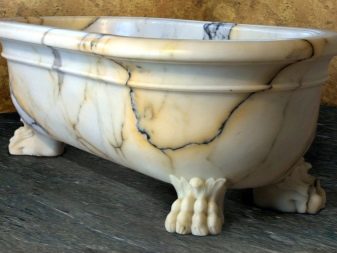
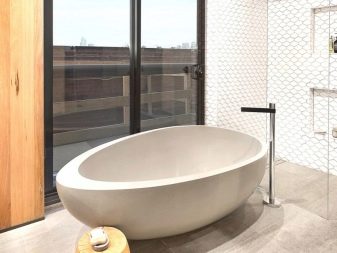
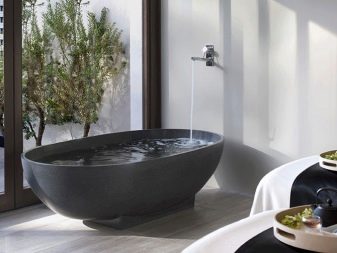
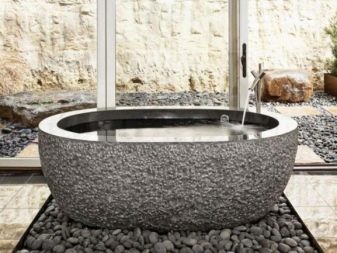
But, unfortunately, the manufacturing process of such a container cannot boast of being perfect, which means that latent defects can appear in the working process. It is impossible to immediately find manufacturing flaws, they become noticeable after a long process of operation.
Baths made of artificial stone, in appearance, practically do not differ from natural material. With the help of modern mechanical processing of artificial stone, manufacturers create unique designs of bathing bowls, exactly repeating the image of natural models. Most often, chips of marble, granite, malachite and quartz are used in production.
In terms of technical characteristics, injection molded structures are in no way inferior to baths made of natural material. The differences between them are only in weight and pricing.
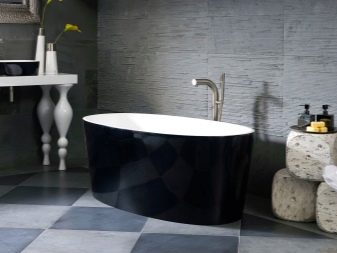
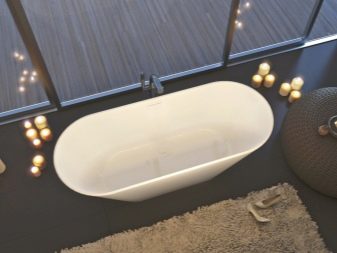
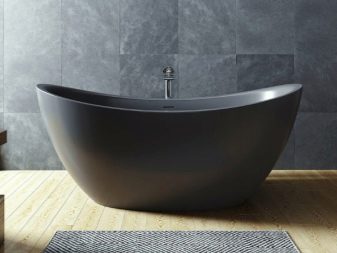
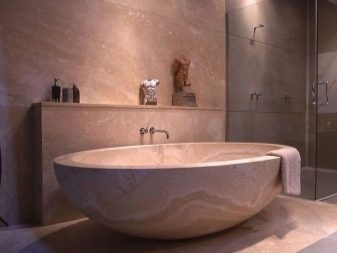
Advantages and disadvantages
The high cost of stone bathrooms often stops consumers from making such a serious purchase. And in order to understand what the sky-high prices are, they begin to disassemble the production process step by step and clarify the characteristics of the sanitary product. The external attractiveness of the products simply attracts the enthusiastic glances of buyers, only in the process of operation it will be possible to recognize the multifunctionality of the structure. And yet, for a clearer understanding, you should carefully study the merits of stone bathing bowls.
- High level of durability. Despite the artificial and natural origin of the material, it is impossible to damage the structure manually.
- The duration of the service life. Stone tanks are a type of permanent sanitary ware. These models are purchased only once and remain a useful decoration of the bathroom for a lifetime.
- Personal hygiene. The surface of the stone bath does not absorb even minimal pollution, the stone material resists the appearance of pathogenic bacteria. For these reasons, stone plumbing is considered the most suitable for the human body.
- Low thermal conductivity. A stone bath filled with hot water is able to maintain the manually set water temperature for a long time.
- A decorative highlight. Stone bathtubs look not only beautiful, but very impressive. They fit well into bathroom interiors. It is advisable to complement the bathtub with a sink made of a similar material or a countertop for the juiciness of the interior.
- Features of natural material. The surface of the natural stone bathtub is covered with a layer of polyester resin, which closes the pores of the material.
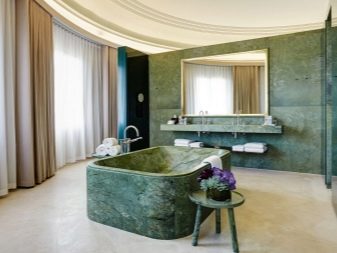
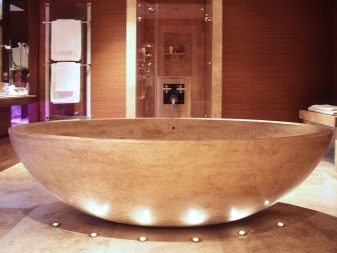
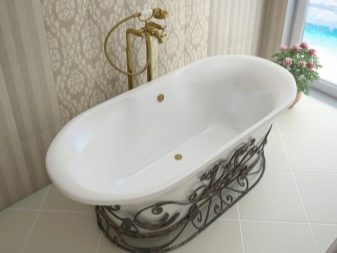
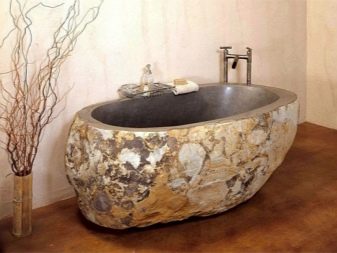
Thanks to this nuance, baths receive additional antibacterial properties and a self-cleaning effect.
Along with the presented advantages, stone baths have an insignificant number of disadvantages.
- Minimum possibility of repair. It is very difficult to carry out repair work on stone bathtubs; restoration of products leads the family budget to significant expenses. It is even more difficult to carry out repair work on bathtubs made of natural stone, since the artificial material is much more malleable, which means that it is much easier to restore.
- Detergents. Housewives are familiar with the method of dealing with serious dirt; they use hard sponges and aggressive detergents to remove them. But it is precisely this method of washing that is strictly prohibited in removing dirt from the surface of stone structures. Chemicals will eat away at the clear coat and the hard sponge will scratch.
- Home beauty salon. Women who are accustomed to dyeing their hair at home need to be extremely careful when using the chemical composition of the dye. Even small drops can stick into the surface of the stone bath and will not be washed away.
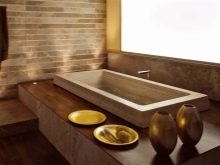
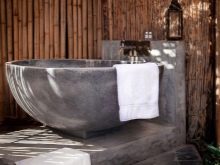
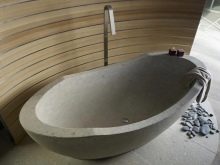
The last and most important drawback is the cost of stone baths. When buying, it is important to know that a high price indicates the quality of the product, and a low price indicates design defects.
Varieties
Modern manufacturers of stone bathtubs, delving into the intricacies of interior design art, create not only rectangular structures familiar to everyone, but also models with asymmetric shapes that can be used in rooms with different squares.
Rectangular models with rounded edges
Traditional form for bathtubs made of stone of any kind. The length of the structures ranges from 160-180 cm, the depth of the container is 65 cm. The miniature dimensions allow you to place bowls of this shape even in small bathrooms, and the color scheme will ideally emphasize the richness of the interior texture.
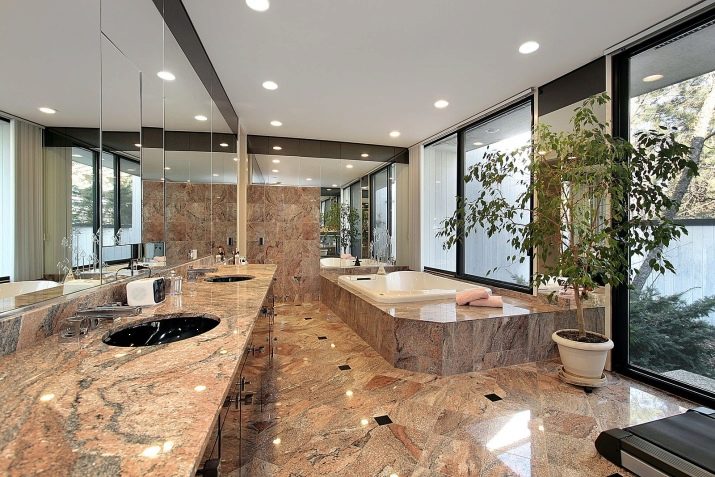
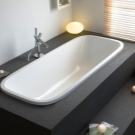
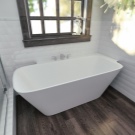
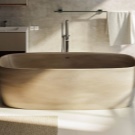
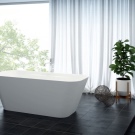
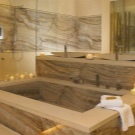
Oval models
Oval stone bath designs look laconic in a modern interior. They fascinate with their linear smoothness, harmonious shapes and materials. Oval modifications of bathtubs have a high level of ergonomics, which simplifies the process of using the device. The only drawback of this form is the impossibility of installing an oval structure in the center of small rooms.
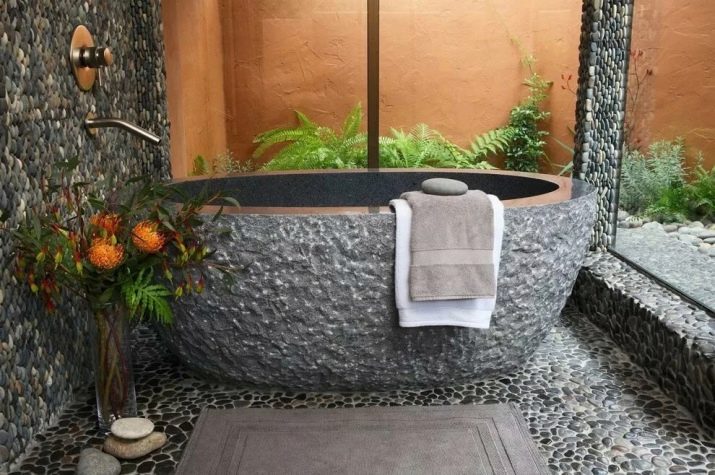
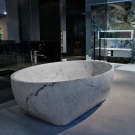
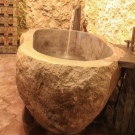
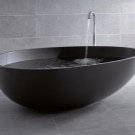
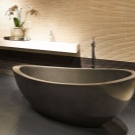
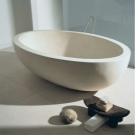
Corner models
Quite compact bathtubs, despite the tangible size. May have symmetrical and asymmetrical proportions. Several bathing bowls are possible in the design. The high pricing policy pays off with its versatility and an increased level of comfort during operation. However, it should be borne in mind: the mass of the bath is several times greater than the weight of oval and rectangular structures.
Interior designers point out that for rooms with a small square, a corner container is ideal. It saves space. Quite often, manufacturers equip corner models with additional functions, for example, hydromassage, lighting, a hidden shelf.
The varieties of containers made of artificial stone are divided into two types, the difference between which is in the crumb. This is a crumb of natural material or quartz sand.
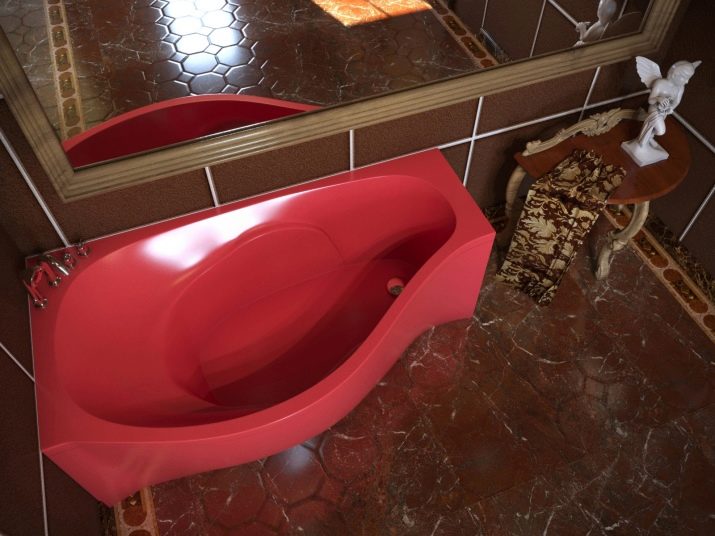
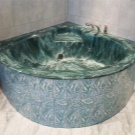
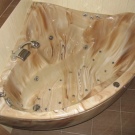
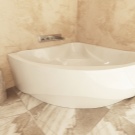

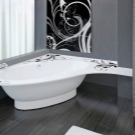
Materials (edit)
The stone bathing bowl is the most demanded, robust and hygienic sanitary fixture with many performance characteristics. With this natural material, the room acquires a special chic, emphasizing the style of the interior and its richness. At the same time, there is not much difference in what material was used in the manufacture of the structure, natural or artificial, although each of them has a number of distinctive qualities.
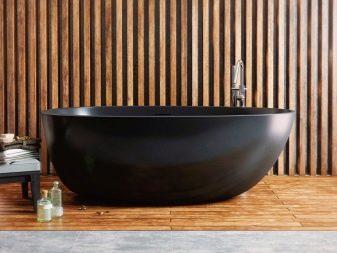
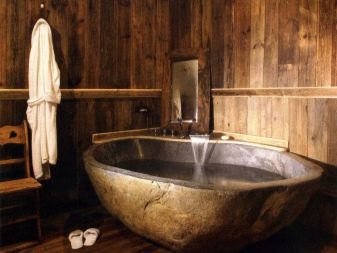
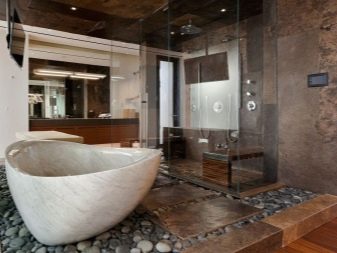
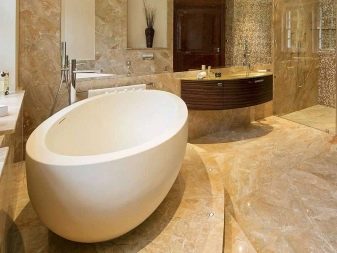
Natural stone baths
In an ordinary plumbing store, it is almost impossible to find a bowl made of natural natural material, because they are made in single models. Accordingly, the price of such a design is very high, which means that it is not available to every consumer. The main reason for the high cost lies in the complexity of the work of the master. It is very difficult to process the stone, and only a highly qualified professional can give it a rounded shape. For the same reason, the line of stone baths cannot please consumers with a wide variety.
Most often in the manufacture of bathing containers are used marble and granite. Undoubtedly, the finished structures turn out to be unimaginably beautiful, elegant, but their mass requires special conditions for the flooring.
Such bowls must be placed on high-quality concrete, otherwise the floor of the bathtub and the ceiling of the neighbors from below will simply not support the weight of the structure.
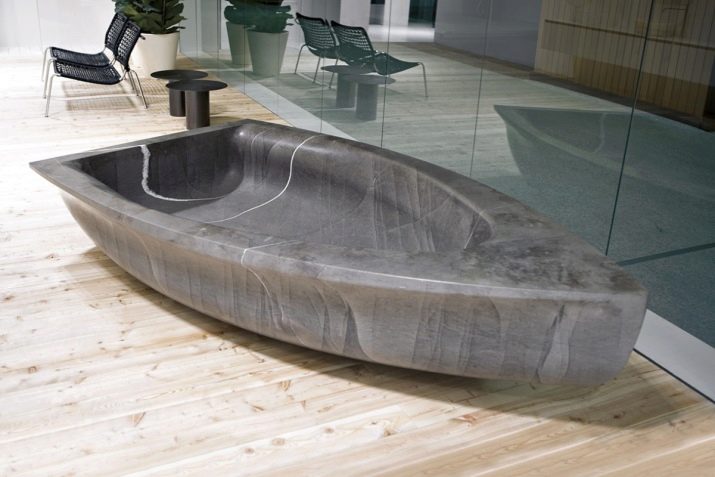
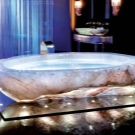
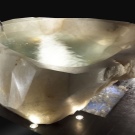
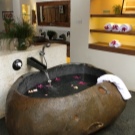
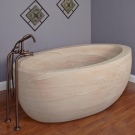
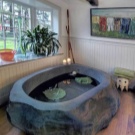
Plastic bathtub
Visually, such designs do not differ from natural material, but at the same time their cost is much lower. Thanks to modern technology artificial baths easily accept the texture and color range of natural minerals. In weight ratio, it is much lighter than natural designs.
When making bathtubs from artificial material, it is mainly used marble and quartz chips. Polyester resin, catalyst and various plasticizers are used as connecting elements.But this does not mean that the strength of artificial structures is low.
Like models made of natural stone, they are able to serve their owners for many decades.
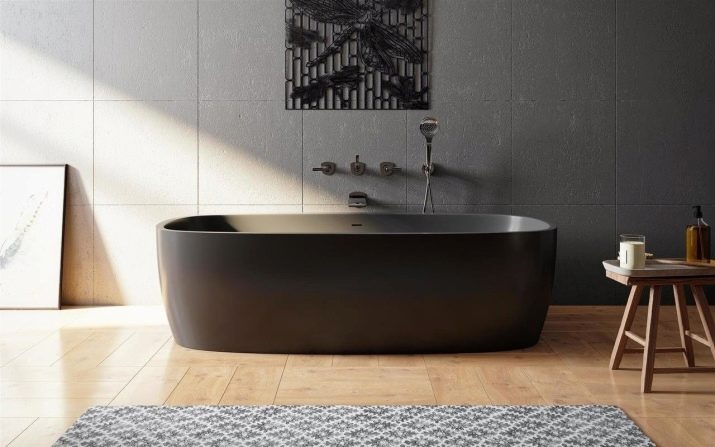
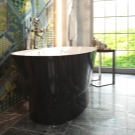
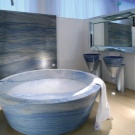
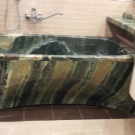
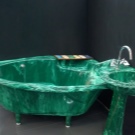
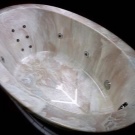
Sizes and shapes
In the manufacture of modern bathtubs, various natural materials are used to give the structure an unusual shape. So, picking up an interesting specimen will not be difficult.
Angular bowls made of artificial stone have a variety of sizes, ranging from the standard 180x80 cm, ending with universal dimensions, namely 120x70 / 75/80 cm for seated structures, 120/150/160/170 / 180x70-75 / 80 cm for full size models. Although the most popular options for modern apartments are dimensions of 150x70 cm and 185x90 cm.
On the one hand, corner baths seem huge, but in fact only they help a person get additional free space, even in the smallest room.
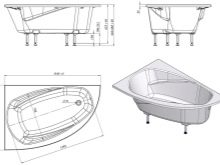
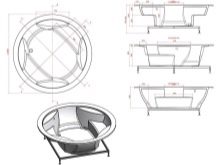
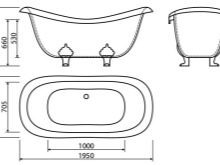
Despite the visual cumbersomeness, it is the corner containers that help to properly organize the space of the bathroom. It is impossible to find bowls with such a unique capacity made of natural material, you have to order them and wait a sufficient amount of time to get a high-quality design.
The range of oval bathing tanks boasts not only a laconic design, but also a soft shape. It is the oval baths that allow a person to relax after a hard day at work. The only inconvenience may seem to be the lack of armrests and landing recesses. In terms of dimensions, oval structures have a certain standard, namely 140x210 cm, but these are not the only copies. Manufacturers of artificial stone bathtubs are ready to offer a wide variety of dimensions, and, if necessary, even make to order.
Containers made of natural stone can be found in the store, but their sizes will not always fit the square of the room, which means that you will have to order the product in the workshop.
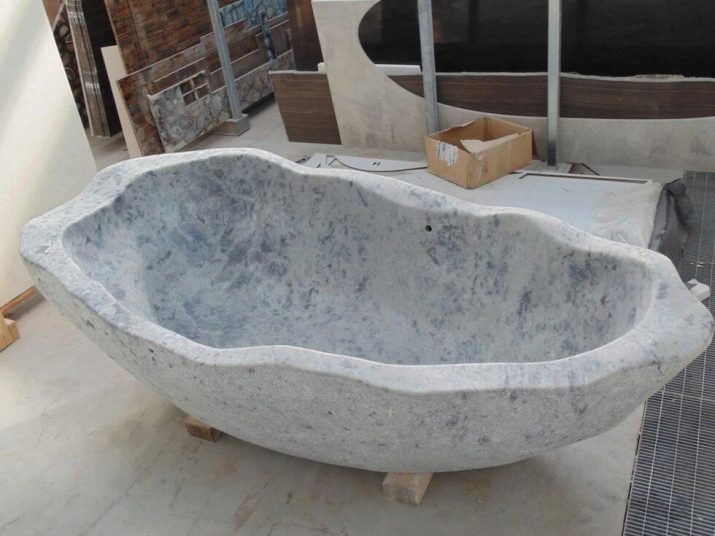
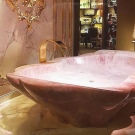
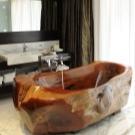
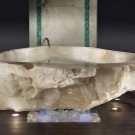
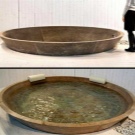
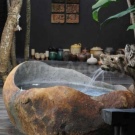
Round baths are considered exclusive work. Depending on the size, they can be single or double. The design must include a hydromassage system. Round tubs are more suitable for rest and relaxation. To experience maximum pleasure, the size of the bathtub should allow the person to stretch out to their full height. For this reason the circumference of the structure ranges from 130 cm to 220 cm.
The main thing is that the bath itself also harmoniously fits into the interior of the room and leaves enough free space.
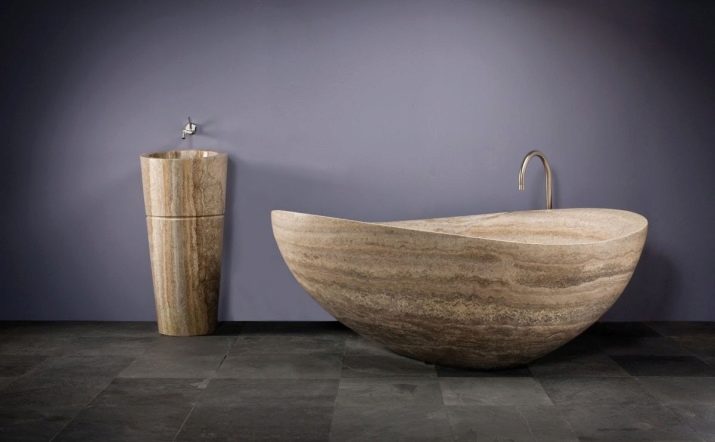
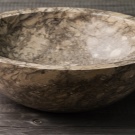
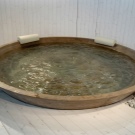
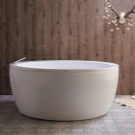
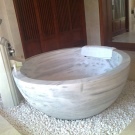
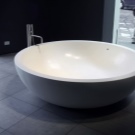
Color solutions
The color palette of natural stone baths cannot boast of a wide variety. For example, we can consider the well-known marble. For the manufacture of the structure, a lump of appropriate dimensions is taken, a bowl is cut out inside, the sides are processed to emphasize the richness and decorative component of the room.
Marble is a self-sufficient natural material, and each new product will have a unique and inimitable pattern with unusual veins, texture and quirky tones. The very color scheme of the bath is determined by the shade of the natural massif of stone. It can be white, beige, gray. The green and yellow palette looks very interesting. But the very luxury and interior decoration can be created by black marble. The color of a bathtub made of any other natural material is determined in a similar way.
And for the production of sanitary ware from artificial stone, marble chips, hardeners and resins of various types are used. All the presented components can be filled with the required color of the color scheme, which results in original colored containers for carrying out hygiene procedures.
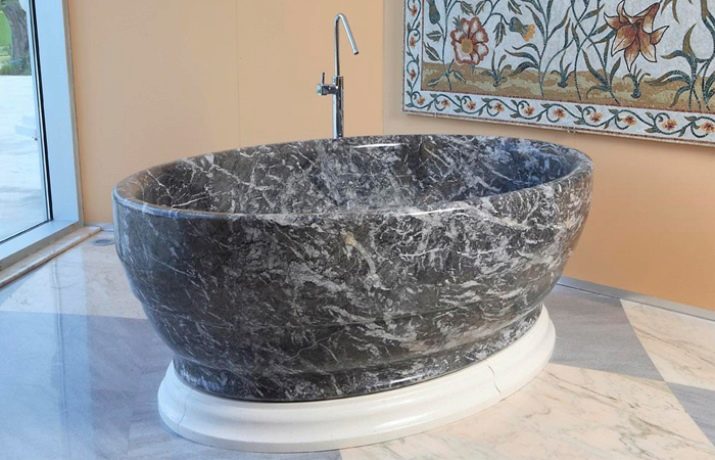
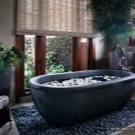
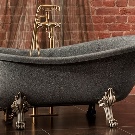
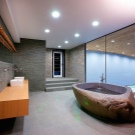
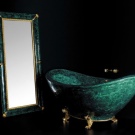
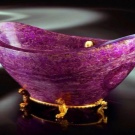
Manufacturers
Today, there are many world famous manufacturers of sanitary products, but not everyone is ready to boast of having stone products in their own line. Russia in this matter is moving forward by leaps and bounds. What is the manufacturer worth Estet. Over the seven years of its existence on the market, the company has managed to achieve world recognition in the production of plumbing fixtures from artificial material.
Firms keep up Astra-Farm and Marmo Bagno... They offer a wide variety of artificial stone bathtubs. Their bins contain unique recipes for making a production mixture, as well as a lot of unusual techniques that give each element of plumbing additional strength and beauty in appearance.
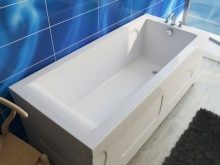
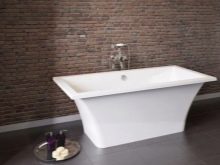
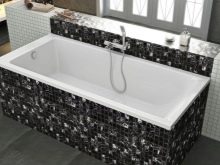
It is impossible to choose the best among the manufacturers of sanitary ware made of natural stone. They all manufacture unique, durable and versatile designs. The brands Salvatori, Teucob and Sign pay special attention to the production of stone bathing bowls. Many users assure that the products of these particular manufacturers meet all the needs of consumers.
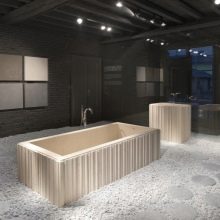
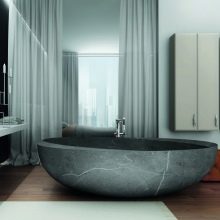
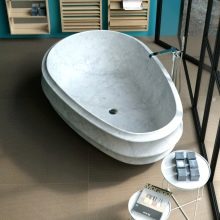
How to choose?
When purchasing a stone bathtub, it should be understood that its cost will be very high. The underestimated cost of the product speaks of the poor quality of the product and hidden defects. To choose a product of the best known brands, thereby the consumer receives an additional quality guarantee for the product he likes.
Studying the model you like it is important to touch its base. The presence of the smallest pores is an acceptable standard, but if a rough surface is felt in large quantities, then the product is of poor quality, it should be abandoned.
When choosing a model made of artificial stone, it is important to pay attention to the composition. The product passport must indicate the elements present, where the stone chips should be 80%, the remaining 20% - resin. The maximum permissible error is 2-3%. A low rate of natural chips indicates a lack of performance.
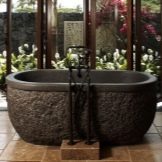
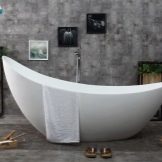
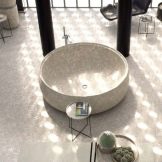
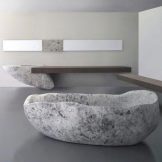
The tint effect of colored bathtubs must be checked at the cut of the structure drain. If the tone is present, it means that the pigment was added to the raw material mixed for production. And thanks to modern technologies, finished models can have an even color, without streaks and patterns. By the way, colored bathtubs are matched to the intended color of the interior, although modern designers suggest making a contrast.
Do not forget about the dimensions of the required design. Before you go shopping, you need to take measurements of the place where the container will stand. At the same time, for spacious rooms, structures of different shapes can be considered, and for rooms with a small square, only miniature models.
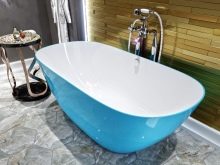
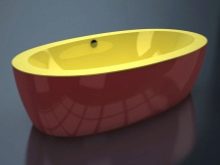
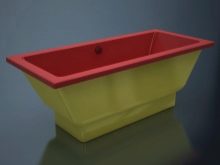
Review overview
Today, a bathtub made of stone is the peak of fashion trends. But not every family can afford to follow the trends in plumbing products. But those who have acquired such designs cannot get enough of it. The heads of families return home with great pleasure and, just before bed, relieve fatigue and stress thanks to the relaxing properties of the stone miracle. Young mothers are ready to bathe their babies for hours, because the water temperature necessary for the baby remains for a long time, which means that the child will be able to splash around until he gets tired. For women, stone baths seem like a real piece of heaven on earth. Pleasant aura of the room, cozy bath, hydromassage, aeromassage, comfortable water temperature.
Many buyers often have doubts about the need to purchase stone sanitary ware. But if you do not consider the option of fashion trends, such designs serve exclusively for human comfort.
Having made a purchase once, you no longer have to spend a dozen years on a new model, as, for example, with cast-iron or enameled copies.
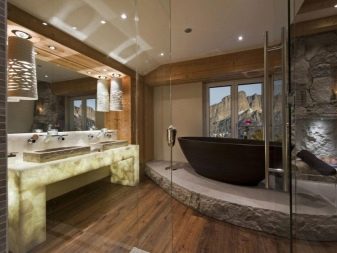
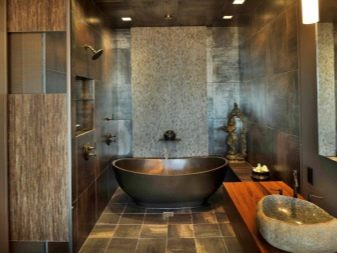
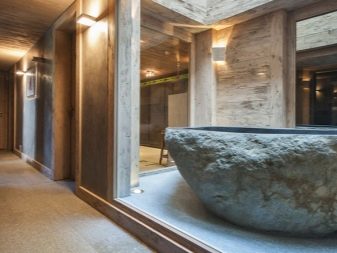
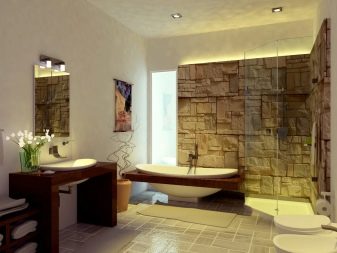
Examples in the interior
Having familiarized yourself with the characteristics of stone baths, it is proposed to consider examples of products made from natural and artificial materials.
- The model made of natural material has a special charm and complements the interior with rich notes. On either side, the structure has a similar pattern and color scheme, which confirms its natural origin.
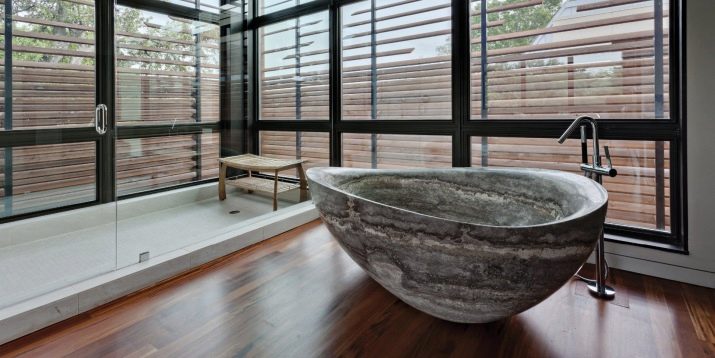
- A distinctive feature of the presented model is the difference in shades of the base of the structure and the bowl itself. But, despite the color difference, the artificial container looks just as elegant and aesthetically pleasing as the container made of natural stone.
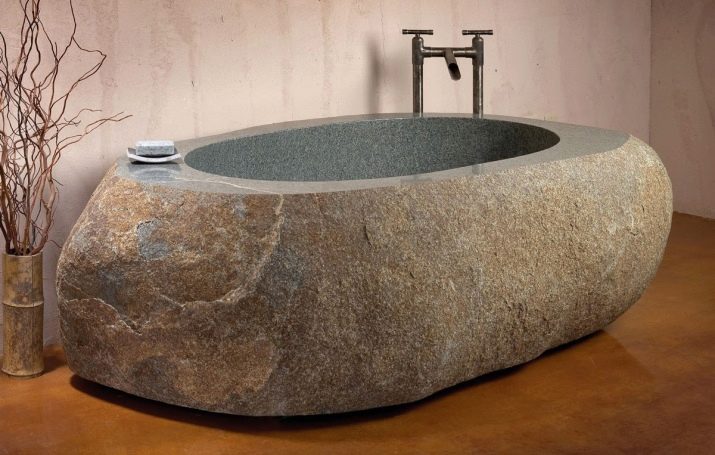
About cast stone baths (RAA Bath Factory, Latvia), see the following video.








